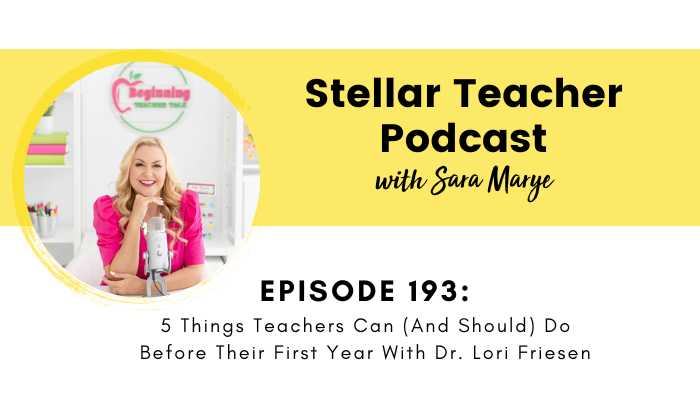
Click play below to hear what new teachers can do before their first year of teaching:
Being a first year teacher, there are so many things on your mind and your to-do list before entering your classroom in the fall. But like most first year teachers, they don’t want to wait to get started on all things teaching and are so eager to get started now. Well, if you’re a first-year teacher, you’re in luck! In today’s episode, I have guest Dr. Lori Friesen, who is sharing five things teachers can do now before their first year of teaching.
Dr. Lori has been on the podcast many times before, and she always brings knowledge, easy tips, and stellar advice to those first year teachers, but also veteran teachers. The ideas we discuss in this episode aren’t only for beginning teachers to do before their first year but also for any teacher. Dr. Lori shares ideas on how to effectively set up your classroom for academic learning, what to include in a classroom management plan, items to include in a teacher binder, first-week activities, and how to develop relationships with parents.
There’s a lot you need to prepare for and think about when getting your own classroom. Every procedure, routine, activity, lesson, and seating arrangement needs to be thought about and planned with your students in mind. But even though all of this can be overwhelming, Dr. Lori shares helpful insight for teachers to do before their first year so you feel prepared and successful for the year to come!
Meet Dr. Lori
Dr. Lori Friesen
Dr. Lori Friesen taught for ten years in Canada and overseas and taught pre-service teachers at the University of Lethbridge before completing her PhD in Elementary Education at the University of Alberta. Dr. Lori has been inducted into the Golden Key International Honor Society in recognition of her outstanding academic achievement and excellence. She is host of the popular Beginning Teacher Talk podcast with more than a half million downloads and creator of the R.E.A.D.Y. for School Academy and The Classroom Management Club. Dr. Lori is dedicated to supporting and inspiring educators around the world.
In this episode on things teachers can do before their first year of teaching, we discuss:
- What teachers can and should do now for next school year
- The practical ways you should be setting up your classroom, specifically keeping student learning at the forefront
- 4 parts to a classroom management plan
- Ways to create engaging first week of school plans that are centered around your students and connections
- How to develop positive relationships with parents and best ways to communicate with them
Resources:
- Grab Dr. Lori’s Book
- Join us for my FREE Summer Book Study
- Sign up for my Private Podcast: Confident Writer Systems Series
- Check out the Stellar Literacy Collective Membership
- Check out my Free Literacy Workshop, The Time Crunch Cure: Create a Literacy Block That Fits it All In and Achieves More
- If you’re enjoying this podcast, please leave a review on Apple Podcasts!
Related episodes and blog posts:
- Episode 175, Secrets to Success for New and Veteran Teachers With Ashleigh Smith
- Episode 138, How to Build Up Your Classroom Library Without Breaking the Bank Dr. Lori Friesen
- Episode 106, Simple Classroom Management Hacks for the Seasonal Changes with Dr. Lori Friesen
- Episode 80, 7 Classroom Management Hacks with Dr. Lori Friesen
Connect with me:
- Join my newsletter
- Shop my TPT store here
- Instagram: @thestellarteachercompany
- Facebook: The Stellar Teacher Company
More About Stellar Teacher Podcast:
Welcome to the Stellar Teacher Podcast! We believe teaching literacy is a skill. It takes a lot of time, practice, and effort to be good at it. This podcast will show you how to level up your literacy instruction and make a massive impact on your students, all while having a little fun!
Your host, Sara Marye, is a literacy specialist passionate about helping elementary teachers around the world pass on their love of reading to their students. She has over a decade of experience working as a classroom teacher and school administrator. Sara has made it her mission to create high-quality, no-fluff resources and lesson ideas that are both meaningful and engaging for young readers.
Each week, Sara and her guests will share their knowledge, tips, and tricks so that you can feel confident in your ability to transform your students into life-long readers.
Tune in on your favorite podcast platform: Apple, Google, Amazon, Spotify, Castbox, and more! If you’re loving this podcast, please rate, review, and follow!
Podcast (stellar-teacher-podcast): Play in new window | Download
Sara
Hey teachers, happy Monday. Now I know you are getting ready to wrap up the school year, which is so exciting. But just for today, I want you to start thinking ahead to next school year. And that’s because I have my friend and classroom management expert Dr. Lori Friesen on to talk about five things that teachers can and should do before the school year begins.
Sara
Now Lori has been on the podcast before and you guys love hearing from her. And that is because she is an expert in helping beginning teachers experience success with things like classroom management, setting up classroom systems and really getting ready for back to school. And while she focuses on helping new teachers, I always love hearing her advice.
Sara
And I hear from you guys that you enjoy hearing from her as well because everything that she shares is still relevant and great reminders for teachers who have been teaching for 5, 10, even 15 or 20 years and beyond. So if you want a fresh set of ideas and action items to take this summer that will really help you feel confident and prepared to kick off next school year, then this episode is for you. So let’s welcome Dr. Lori back to the show.
Sara
Hi, Lori, welcome back to the podcast. Of course I am so excited to have you on as a guest today.
Dr. Lori
Hi, Sara, I always love coming on to your podcast. I adore you. And I love the work you do.
Sara
Thank you so much. So if you have been a longtime listener, then you are probably very familiar with Dr. Lori Friesen, because she has been a guest on the podcast. I think this is your fourth time now coming on the podcast.
Dr. Lori
Either third or fourth. I was trying to remember when I came on. But yeah.
Sara
Yeah, it’s been a couple of times. And I know you are an expert in supporting first year teachers in all things, classroom management, setting up their classrooms, and so many teachers in my audience, so benefit from these conversations, because the reminders and the suggestions that you give for first year teachers are still so relevant to any teacher, regardless of how many years that they have been in the classroom. So I’m always so grateful that you’re willing to come on and share your knowledge with my audience.
Dr. Lori
You know, it’s so interesting you say that I’ve always said it’s for new teachers. But the more I do this, and what we’re going to talk about today, I want you to think about if you’ve been teaching for 10 years or 15 years, how you can streamline how you prepare for the year even more when we talk about this.
Dr. Lori
Because there’s so many little things you’re like, oh my gosh, why didn’t I think of doing that sooner? Why didn’t I because we get into our mindset that we have to do all of this right before school starts, which is the worst time because there’s so many other things that we need to do then. And we literally, I was teaching some of my more experienced teachers, you can set this all up and be ready before the end of this school year, for next school year.
Dr. Lori
So if you’re an experienced teacher, and you’re listening to this, have your your teacher brain on thinking about what can you do now, because future you is going to thank you so much for doing this work now. And thinking ahead, even though it’s hard, we’re all tired at the end of the year. But you have a lot of resources ready or even at your fingertips that you can grab and be like, Why not photocopy a lot of things now? There’s a lot of things you can do.
Sara
Yeah, I love that. And I that is like one of those things where it’s like, yeah, the end of the year, I know teachers are tired, and all they’re thinking about is summer break. But to your point, like if we can tap into like future us, right, like August, September us that we did this now.
Sara
I think it took me a couple years when I was in the classroom. But eventually as I was cleaning up my classroom, I was like, Okay, how can I put my classroom library away? So it’s easy to set it up in the fall? How can I, you know, put my classroom files away, or whatever it is, that will make it easier to unpack in the fall. So I’m so excited that we’re having this conversation at the end of the year.
Sara
Now I know a lot of the things that you’re going to share come from your brand new book that you just published. Can you share just a little bit about that experience to kind of give some context for what we’re gonna be talking about today?
Dr. Lori
Yes, I’m so biased, but I absolutely love this book. I feel like I’ve been writing this book for 20 years, because it’s literally I’m like the mom of new teachers. It’s called Dear New Teacher, Here’s Exactly What to Do. And the subtitle is exactly what I want you to do. It’s a five step ready for school roadmap for elementary.
Dr. Lori
And it walks you through the five key areas. We’re going to touch on them today of what I want you to think forward to in terms of preparing for your first classroom or revisiting your class. If you’re changing grades, if you’re changing schools, or even if you’re an experienced teacher, and you want to streamline how you’re doing things, it’s so helpful and so valuable. So I cannot wait to get this out into the world. It is released on May 1.
Sara
Perfect. Yes. So teachers are able to order this now. And while I do love your title, Dear New Teacher, I am going to say I do think this book is for all teachers. So again, don’t let the dear new teacher discourage experienced teachers.
Sara
And I think for me, like I, I struggled with classroom management, and just systems, and all of those things my first couple of years. And so I so appreciated that there were resources like this out there, that even as a semi experienced teacher, I was able to, you know, figure out some things to help. So, new teacher experienced teacher, we’ve got tips to help them get ready for the school year to begin.
Sara
So let’s talk about some of those things. So really, what do teachers need to consider and keep in mind when they are setting up their first classroom or their second or third classroom?
Dr. Lori
Yeah, in all of the years that I’ve been working with teachers, one of the things that stresses new teachers out the most, especially is knowing how to set up that first classroom, it feels so big.
Dr. Lori
Because I don’t know about you. But for me, I didn’t even have my own place really yet, I just moved into my own place. So this felt like my own like my own home, almost. And if you’re anything like when I first started teaching, I spent way too much time and focus decorating my classroom, and not enough time thinking about all of the other things we’re going to talk about today.
Sara
And save money, too. Let’s talk about this.
Dr. Lori
Yes, you do not need to spend a ton of money. I mean, there’s so much that is going to be donated to you that you don’t even realize yet. Other teachers are gonna see what you that you’re a new teacher, and they’re gonna offer things to you. They give you books from their libraries, there’s just so many options for stocking your classroom. So yes, you do not need to spend a lot of money.
Dr. Lori
But some of the kinds of things that I want new teachers to think about, and you’re probably not thinking about this at all, are some of the very practical things. Like the first one, I really wish someone would have told me, ask yourself, can I see every student no matter where I am in my classroom at all times? Are there any blind spots?
Dr. Lori
I remember my first year of teaching, and I tell the story in the book of I was in a small group reading activity with my students with some students. And in my reading corner, I created this really cute little reading corner, it was a really cute reading notebook. And it gave kids a little bit of privacy and a little separation.
Dr. Lori
But I had effectively created the perfect blind spot in my classroom and two of my boys got in a fistfight. And literally, there are bloody noses, and I was afraid I was gonna lose my job. Like just little things like that, that seemed like not a big deal. Arguments can become huge when you are not noticing some of the spaces that are blind spots. So that’s the first thing.
Dr. Lori
The second thing is really pay attention to your electrical outlets. I know these aren’t the sexy things that you want to be talking about when you’re thinking of setting up your classroom. But I accidentally put a bookshelf against one of the main outlets at the front of my room, not even realizing it. But those are the kinds of things later you have to reset things up all over again, because you don’t realize that you just weren’t paying attention to that.
Dr. Lori
And then the third thing I really encourage new teachers to think about is when you’re choosing a classroom theme, because a lot of teachers choose themes for their classroom. Be sure that the lettering on any of your decor is easy for kids to read and is not in cursive. Even if you’ve been hired to teach fourth grade, and it can change at any moment. Honestly, if you can be hired to teach fourth grade.
Dr. Lori
I was in my think it was three weeks before school, I saw my principal in the parking lot. And he said oh, by the way, you’re changing, you’re going to be teaching second grade. And I had already got everything set up. I was like, I’m so excited. And I did change everything classrooms and everything. And a lot of my stuff was in cursive. So we don’t think about it because it looks cute.
Dr. Lori
But the fonts that you choose, the decor that you choose, make sure that everything that you put into your classroom, remember, it’s about the kids, it’s about being an instructional resource for kids. That’s the only reason we have things up not the only reason. But a large part of the reason we have things up is to teach kids.
Sara
I love those reminders. And again, these are things that I sort of had to learn the hard way. It’s funny because you said you were a fourth grade switch down to second grade, I was a second grade teacher in the middle of the year who got moved up to fourth grade. So you know, having to go through that.
Sara
But yeah, it made me quickly realize it was like Okay, wait a minute here like I don’t have like it’s hard to make that transfer and I had I made some smarter decisions in terms of decor or even materials, I could have brought a lot more of that stuff with me.
Sara
But I I think that point about making sure that we can see all kids at all points in time. Like that is something that eventually I was like, Okay, first thing I need to set up is where is my small group table going to be? Yep. And can it see every student while I am sitting there, rather than starting with like, Let me arrange my desks and then put the table wherever it’s like you have to start with like being able to see all students at all times. So such a good reminder.
Sara
And I think especially for teachers who are currently in the classroom, these are great things for them to think about now like as you’re packing things up, you know, map out how you want to set up your classroom next year if this if this setup, this current setup did not work for you, like make some notes so that way it can be improved next year. So, love those reminders.
Sara
Okay, so one of the things that I know, new teachers, all teachers really have to put together at the start of the year is a classroom management plan. And I remember that was so challenging to create having zero experience in the classroom. So what should new teachers include in their classroom management plan?
Dr. Lori
Yeah, so one of the biggest things that you can do if you’re new teacher listening right now, to prevent stress, I’m all about preventing stress throughout the year is thinking through how you want to create your classroom management plan before the school year begins.
Dr. Lori
I don’t know if you’ve ever tried to read a map while you’re driving your car. But that’s what it feels like. If you’re trying to slow down and figure out your classroom management in the middle of the year things are going so fast. If you’ve never been a full time teacher, you don’t realize there is no busy like teacher busy and there’s no busy like back to school, new teacher busy, right.
Dr. Lori
So this is the time you have clarity, even if you’re sitting by the pool, even if you’re hiking, I want you to start thinking about this doesn’t sound like something you might want to do right now. But please do it, how you want to create your classroom management plan.
Dr. Lori
So there are four parts that I recommend all teachers including their plan. The first one is class rules, or classroom agreements. So some people call them classroom agreements. But I want you to think about no more than three to five rules and make sure that they’re stated positively. And the thing is, kids support what they help create. So I always encourage teachers to think through in advance what their non negotiables are, and what that will look like throughout the day.
Dr. Lori
And so for example, if one of your non negotiables is listen to the speaker, once you’ve decided this in advance, then you can and should involve your students and coming up with what that looks like throughout the day in the classroom. So they’re supported in the process. They’re part of this process of developing them. But you have decided in advance what the non negotiables are.
Dr. Lori
And I think we get mixed up in like co-creating rules, but you go anywhere else in society, if you go to McDonald’s, if you go to the movie, movie theater, kids don’t co create the rules there for a reason. We need to keep them safe. So we need to decide on how can we best keep children safe? And then involve them in Okay, what does that look like? How does that feel when someone really listens to you? How does that feel when they make eye contact? When you’re asking the question and they’re, they seem really interested in what you’re saying?
Dr. Lori
So that’s the first part is thinking through what are your non negotiables in terms of general agreements in your classroom.
Dr. Lori
The second thing is your routines and your procedures. Now if you’ve read Rosemary and Harry Wong’s book on classroom management, you know that they talk all about routines and procedures. So think through in advance all of the things that kids are going to be doing on a regular basis inside your classroom. If it happens every day, or every week, you need a routine for it.
Dr. Lori
So for example, you need a routine for first thing in the morning when kids arrive, or when kids come in after recess and after lunch and for home time. And you need to teach each routine as carefully as you would any other content in your classroom, in the first weeks of school.
Dr. Lori
Even though we feel like we don’t have enough time for that we feel like we need to dive into content. I always tell my Academy members, we need to go slowly at the beginning of the year, so we can go quickly the rest of the year. So that’s the second part.
Dr. Lori
The third part, I really encourage teachers to have balance in terms of a whole class positive motivator, and natural consequences. So what do I mean by that?
Dr. Lori
A whole class positive motivator is, I know in reward rewards in general have been a bit controversial in education that we, we cannot place kids in a system that’s literally built on extrinsic motivation, giving grades, and then tell teachers that we don’t use rewards in school, it’s just doesn’t seem fair to me. In my classroom, we work towards something positive as a class. And that helps to build community and a sense of teamwork, which I love.
Dr. Lori
So my classroom, I have this treasure map and a treasure chest and my students earned stories for you know, getting spaces around the treasure map. And we had this big Popcorn Party and pajama pirate party at the end, which was so much fun, it was magical. But the kids all worked together. So decide what kind of a whole class positive motivator you might want incorporate into your classroom, and then balance that with natural consequences.
Dr. Lori
So think through in advance what the natural and immediate consequences will be when kids don’t do what you’ve asked them to. And this is not like a if they do, they will do it. Because that’s part of what it means to be a kid they’re gonna push the boundaries.
Dr. Lori
And consequences don’t need to be punitive. They’re just the way the world works, right? So outside of school when kids want to go to the ice cream store, but they’re messing around and they don’t get there in time the stores closed it doesn’t mean we don’t love them. It doesn’t mean we’re upset with them. It just means well, you didn’t get your you know, you didn’t get there in time and so the store is closed.
Dr. Lori
So in school, for example, when you’ve taught and modeled your routine for how we walk to the reading corner, and then Justin runs and catapults himself over the couch to get there so we can get the best seat, the natural consequence is just to have him go back to his desk, and try again once everyone else is seated in the reading corner, right.
Dr. Lori
So I encourage teachers to start thinking through how they can deliver a natural consequence, quickly and consistently in a lot of common situations before school starts. So those are the four parts of a classroom management plan.
Sara
I love that. And the way you break it down seems so simple. And I especially love the part about how we can set the rules or agreements ahead of time and have students help build those. I know, you know, when I first started teaching, it was like, I made my own rules poster. And then I feel like as I transitioned a couple of years, it’s like the students helped me generate the rules.
Sara
But I remember there were so so much like, almost like a challenge. I was like, Well, I want them to come up with these rules, but like their spoke, you know, it’s like, it felt just like forced, but I love that where it’s like, no, I get to set the rules, but then they get to help, like, create the expectations for that. So such good advice there.
Dr. Lori
Thank you.
Sara
So how can new teachers prepare in advance for planning and assessment? Again, thinking about the fact that it’s like there’s, this is so new, especially for new teachers, but what are your what are your suggestions for them in that area?
Dr. Lori
Yeah, especially because I don’t know if you remember, but moving from student teacher to teacher, you’re used to making whole lesson plans right, from beginning to end, you’re writing a whole page lesson plan. And it’s just not possible when you’re going to be teaching eight or nine subjects, a lot of teachers are in elementary. And so we very quickly need to learn how to plan for a week at a time or at least a couple of days at a time.
Dr. Lori
So the first thing I really encourage teachers to start thinking about now is your teacher planning binder. Whether you set this up online or as a paper binder, it needs to include space for your daily and weekly lesson plans, even if you’re planning a day or two at a time first, and then you move into that.
Dr. Lori
And then sections for different resources to make your planning much more simple and more streamlined throughout the year. So for example, first name checklists for things like Scholastic Book orders or hot lunch forms and a number of other things that you’re going to use them for. I had hundreds of first name checklists always on hand and you use them for anything that you need in your classroom.
Dr. Lori
I always had a master calendar in my planning binder, because when it never fails, when you’re in a meeting or you’re some you’re in an IEP meeting, and they mark the next one, and you don’t have your phone with you, or you don’t have some your computer with you, and you just have to jot it down. Well, I didn’t have anything with me to copy it into. So I always had a master paper calendar in my planner.
Dr. Lori
You also need space for your year plans, your scope and sequence plans. And I really encourage new teachers to start thinking through and sourcing out year plans and scope and sequence plans and not start from scratch. Literally hundreds of 1000s of teachers have done this before you this is not the first time anyone’s taught third grade math. So please do not start, like create recreating the wheel from scratch.
Dr. Lori
You’re nodding your head, nobody can see this. But we are fully in agreement on this one. Because I see so many people spending their whole summer working on creating year plans from scratch, not necessary. Ask your district, ask your administrator, ask your grade level team, ask anyone you can for help with this.
Dr. Lori
And then the last section I always include in my teacher planning binder is a section for meeting notes, especially IEP meetings, things like that, because you just want to have something quick on hand a template that you can then put inside of a student, your students folder, or your students section of your filing cabinet, which we can talk about next. And make sure that you always have that on hand. So you have a record of the meetings, because I don’t know about you, I forgot a lot of things very quickly after those meetings, I had to write them down.
Dr. Lori
And then the second thing I always encourage teachers to start thinking about is setting up a student data binder. So you can set up a system to easily track all that student data that you’ll be collecting throughout the year. And of course, I’ll go into a lot more depth about both of those in my new book. But those are the kinds of things I want you to start thinking about now even if it’s not on your radar, just start thinking about well, what is a student data binder, what would I need to include in there?
Sara
When even just like you know, so many of the things that you mentioned, for the planning, like whether you’re a new or experienced teacher, that’s something that you can create now, in May and just have it done and ready for like, we already know the dates of the year, for next year. We already know the calendars.
Sara
And I love your point about encouraging teachers not to reinvent the wheel, right? I mean, I remember I was always that teacher and and I mean, I fully believe this teachers know their students, best teachers know how to best serve their students. And I feel like oftentimes, the supplemental things that a teacher could create is oftentimes exactly what their students need.
Sara
But we are also limited with 24 hours a day. And some of those times we do need to sleep you know. And so just recognizing that, like if something exists, you can totally start with what exists and you don’t have to create everything new.
Sara
My professors, I got a lot of really great advice before I started and what something that always stuck with me is when I was getting ready to be a first year teacher, one of my professors reminded us, we will not be good at most subjects our first year. But if every day, you can pick one lesson to knock out of the park or one subject that is going to be amazing, put all your time and energy into doing that as opposed to trying to do everything well and sort of like failing at it. So sort of just like recognizing that we can’t perfect everything. So pick one thing to add little sprinkle into and then just use what is given to you.
Dr. Lori
Yeah because we can always adapt things most of us do we adapt a lot of things that were given anyways, if we’re given curriculum, we do have to change it for our students. But yeah, it’s so easy to take what someone else has given you and adapt it, instead of creating it from scratch.
Dr. Lori
And the second thing is, like when you were talking about how other people have already done this, like, allow yourself the luxury, and it is a luxury, it feels like a luxury to invest in curriculum in a subject, especially where you don’t feel confident, because there’s another teacher who’s like lives and breathes science. And if that’s not your thing, grab their lesson plans, I did that.
Dr. Lori
And when I was teaching elementary, and it was the best thing I could have ever done, because I was an amazing science teacher, even though I had no idea how to teach science, I would have, I never would have made lessons of that quality. So allow yourself that luxury.
Sara
Because a lot of it is just like us having a mindset shift that it’s like, it is a luxury or such a gift to have either a co teacher or access to you know, it’s like the teachers in our membership who get to access our resources without having to do the work themselves. It’s like there’s so many things available to us because of the internet. See how you can take advantage of those luxuries. So I love that frame of mind.
Sara
Okay, how can teachers create engaging and effective first week of school plans? I feel like this is something that I probably did start thinking about in May, you know, for like August, what are you, what are your tips and suggestions for that area?
Dr. Lori
So what I love the most about this question is planning for that first week of school in advance frees you to do all of the other last minute things that you need to do as school starts up again, you can literally plan for your first week of school before the year ends, as we talked about at the very beginning of this interview.
Dr. Lori
Once you have a clear process for how you’ll set up and manage your classroom, this is totally doable. And a lot of new teachers don’t realize especially how many schools scheduled PDs they’re going to need to attend right before school starts. So creating these first week of school plans in advance is so helpful.
Dr. Lori
So when you’re creating your first week of school plans, I always suggest that teachers be strategic about it. So the first thing is to choose activities that will allow you to get to know your students. So of course, any activities like interest inventories, anything simple that allows you to get to know a little bit about students likes, preferences, dislikes, in school and outside of school, what they’re comfortable with what they’re uncomfortable with, those kinds of things are super helpful.
Dr. Lori
But then choose activities also that allow your students to get to know each other and make connections. So lots of different activities focus a lot on you know all about me, or you know things about me, but you really want kids to start building those connections, because that’s how you build community. And it has to be very intentional.
Dr. Lori
So one of my favorite activities at the beginning of the year was something called something in common. So my kids had to go around the classroom and find 10 things they had in common with other kids. And it was really cool, because kids didn’t realize, you know, maybe they both had a younger brother who kind of was annoying sometimes, or maybe they both loved pepperoni, pizza, whatever it is. But noticing those things that they have in common helps to build those bridges and starts to build relationships in ways that you might not have anticipated.
Dr. Lori
And then the third thing I really encourage teachers to intentionally build into their first week of school plans is an activity that allows them to practice noticing all the good in your students, and reinforcing it to celebrate the uniqueness of each of your students. So whatever works for you, I’m going to give you an example of what I love to do.
Dr. Lori
But we used to do something called secret compliment envelopes. And so everyone had a secret buddy, at the beginning of the week, they created this little envelope, and every morning, they would draw somebody’s name, and they would write a compliment for that student and put it in their envelope. And at the end of two weeks, we just were building the habit of getting to notice the good in each other and practicing what it felt like to give a genuine compliment.
Dr. Lori
So the beginning of the day, after lunch, after recess, that home time, you’re building in the habit of noticing the good. And especially for us as teachers, I noticed a lot of us getting negative at certain times throughout the year, this is a great thing you could do not just at the beginning of the year, but to help to shift the energy to being more positive during times of stress or when we’re feeling like ah, you know, I just they’re not really relating, they’re not doing well as a community, we need to have some positive energy that that’s another activity that you could do throughout the year.
Dr. Lori
And then while you’re doing all those activities, I really encourage teachers to focus on intentionally teaching, modeling, and practicing all those routines and expectations that you’ve taken the time to get crystal clear about because you’ve crafted your classroom management plan. So you’re teaching them how everything works in your classroom as they’re doing these activities.
Sara
So many good nuggets in there, you know, especially the secret compliment when I was like I could that is such a great such an easy thing to do and such a great way to build that classroom culture that is going to you know, be a part of your classroom for the entire year.
Sara
But I love just the reminder because yeah, it’s like when we get to August or September we are so busy with meet the teacher night and PD and you know making all the photocopies or whatever that we don’t always have the time or mental clarity to create those first two weeks of activities or the first week of activities the way that we want.
Sara
So I think like encouraging teachers now, when they have a little more freedom, a little more time, a little more headspace, and this is where I think like the internet, Instagram, Pinterest, like, do some research, see what other teachers are doing. And then be really intentional about that. Because if they are done now, then you’re going to be so glad that they’re just like ready to go come August.
Sara
Okay, what advice do you have for teachers when it comes to developing positive parent relationships? This is always such a challenging one, I feel like.
Dr. Lori
Yeah, and I think for me, what I finally learned after the first few years was this was the one of one area that if I was intentional about developing and maintaining parent relationships, it’s like developing relationships with your students, the more intentional you are about it, the more powerful they become right, the more genuine they become.
Dr. Lori
So this is the fifth thing I love to coach teachers on at the beginning of the year before they start their first year. You know, we’ve heard the expression of failing to plan can mean planning to fail, right? Even though we don’t realize that not intentionally doing this can can really provide a lot of challenges throughout the year. So I want you to prepare in advance for how you will intentionally establish a maintain parent relationships throughout the year, so that you can clearly communicate this to parents at meet the teacher night. So we could talk about this for an hour.
Dr. Lori
But some of the things I really encourage teachers to get clarity around are, first of all, how you will establish daily, weekly and monthly communication with parents. So it isn’t enough to send home a monthly newsletter. But you need to get clear on how you will do this. And then make sure that you communicate with that that to parents on meet the teacher night. So how often will you send home a newsletter? How will you use Class Dojo or how do other teachers at your school stay in touch with parents? That’s the first thing.
Dr. Lori
The second thing I want you to think about is how you will get parents involved throughout the school year and how you will communicate those opportunities to parents. So find out in advance what the rules are at your school around this. Some schools allow parent volunteers, some don’t. Will you have regular volunteers in your classroom for specific tasks or at specific times? Are there field trips that you already know are scheduled or special events that you’ll need parent volunteers for? These are all things you can think through in advance and then ask for help on at meet the teacher night.
Dr. Lori
The third thing is how will you keep parents in the loop about formative assessment, because you want to prevent surprises. Everything I do is about preventing surprises, prevent problems during parent teacher conferences, so they can support their kids at home. And so that you truly are we hear this term partners in education all the time. It feels like a cliche, but when you really do keep them in the loop, it feels more like a partnership. And parents really appreciate it.
Dr. Lori
And then the fourth thing I want to leave you with is how will you contact parents when you have good news, right? We fall into this habit sometimes of only contacting parents when there’s a problem. So can they expect a positive phone call home from you every now and then when their child does something that you are exceptionally proud of them for? Will you send home positive postcards or positivity bracelets.
Dr. Lori
I sent home these little bracelets that were fluorescent with my kids. And it said Mrs. Friesen is so proud of me because and then asked me all about it. And so they would ask the or the parents would ask about that at home because I told them I meet the teacher night, watch for these bracelets, right. So let parents know in advance what you’ll be doing, how you’ll be doing this, and what they can expect.
Dr. Lori
And there’s, of course so much more. But these are all the kinds of things that teachers can get clarity on and think through and plan for in the months before school starts. So they aren’t racing and stressing in the weeks before school starts. And so they can start the year with that common confidence that we all want.
Sara
I love it. And I just think again, any teacher who takes action on even one of these things this summer, is going to be set up for success this school year. So of course Lori, I always appreciate it when you come on, you provide just so much really practical strategies and knowledge for teachers to be successful in the classroom.
Sara
You know, obviously, we talk a lot about literacy on my podcast here. But there’s so much more to teaching than the content side of things. And teachers really do need support when it comes to the management and the planning and all of that. So I’m always just so grateful that you’re willing to come on and share your knowledge with my audience.
Dr. Lori
I love spending time with you. And I just think you have a fabulous audience. So I’m so happy to be here. Thank you for the opportunity.
Sara
Absolutely.

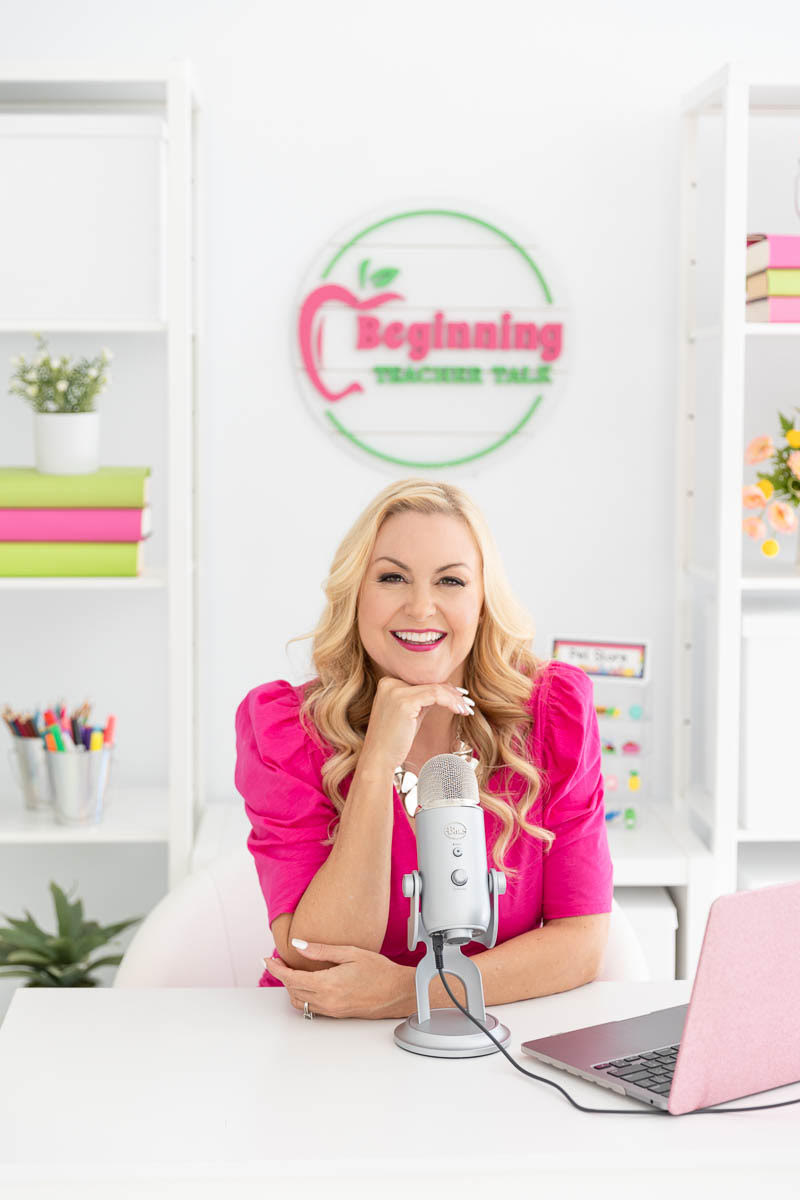
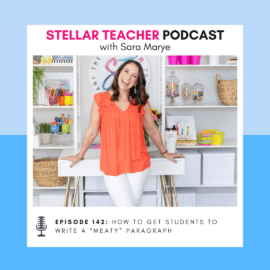
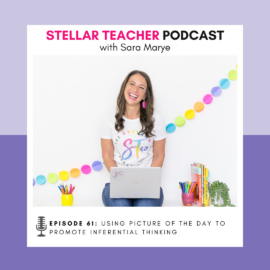
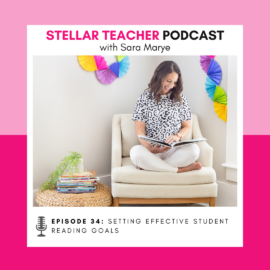
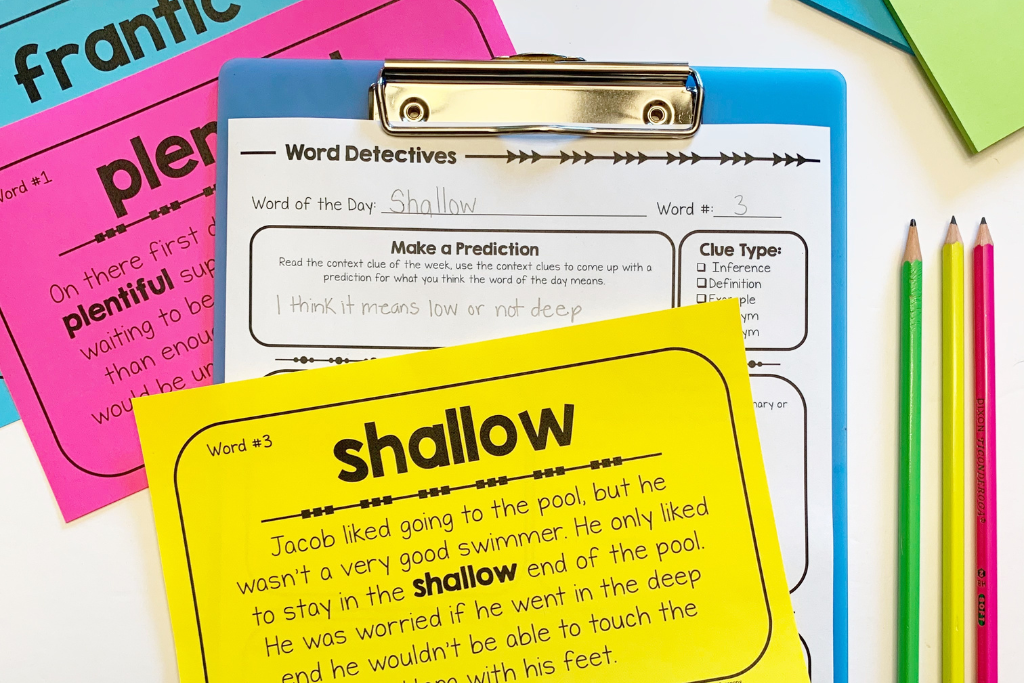
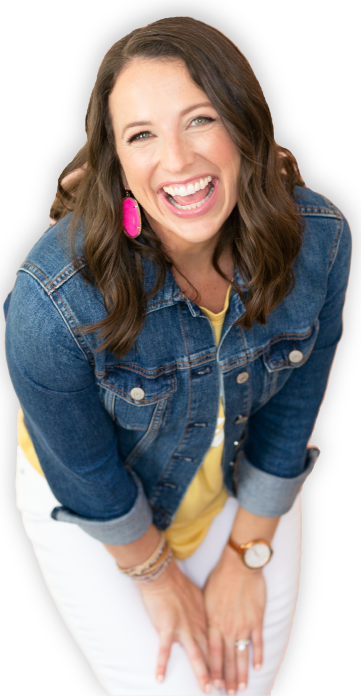
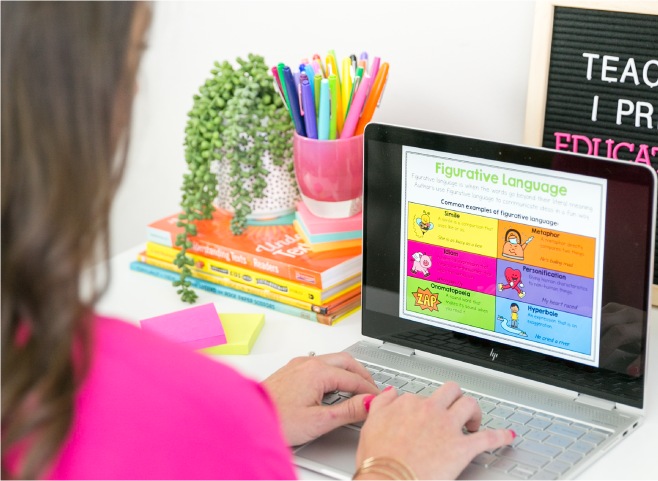
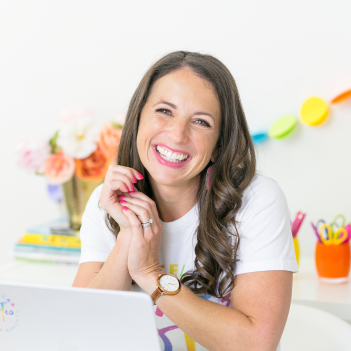
Leave a Comment
You must be logged in to post a comment.